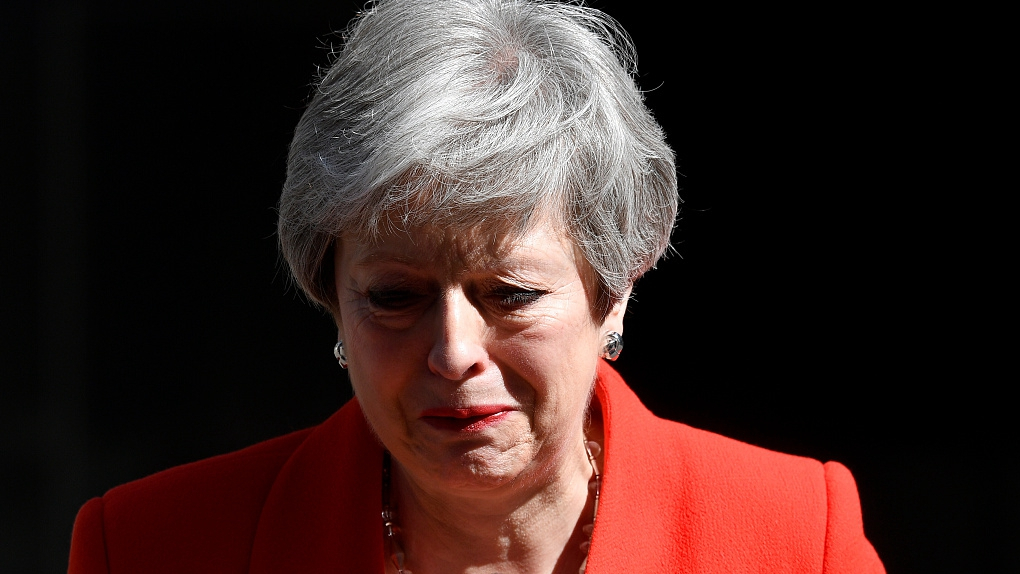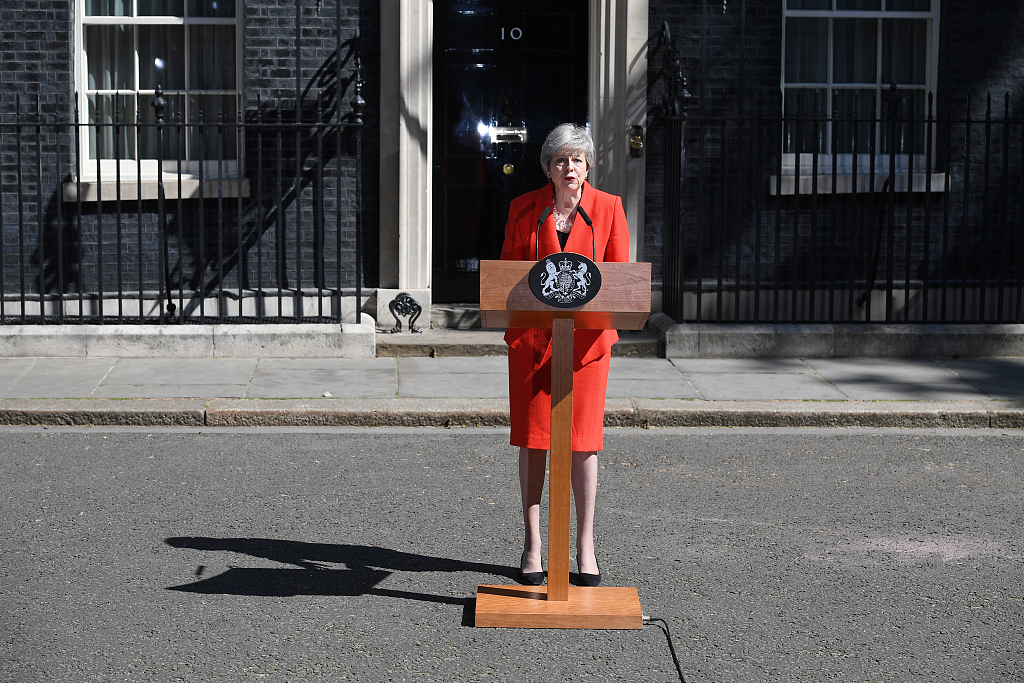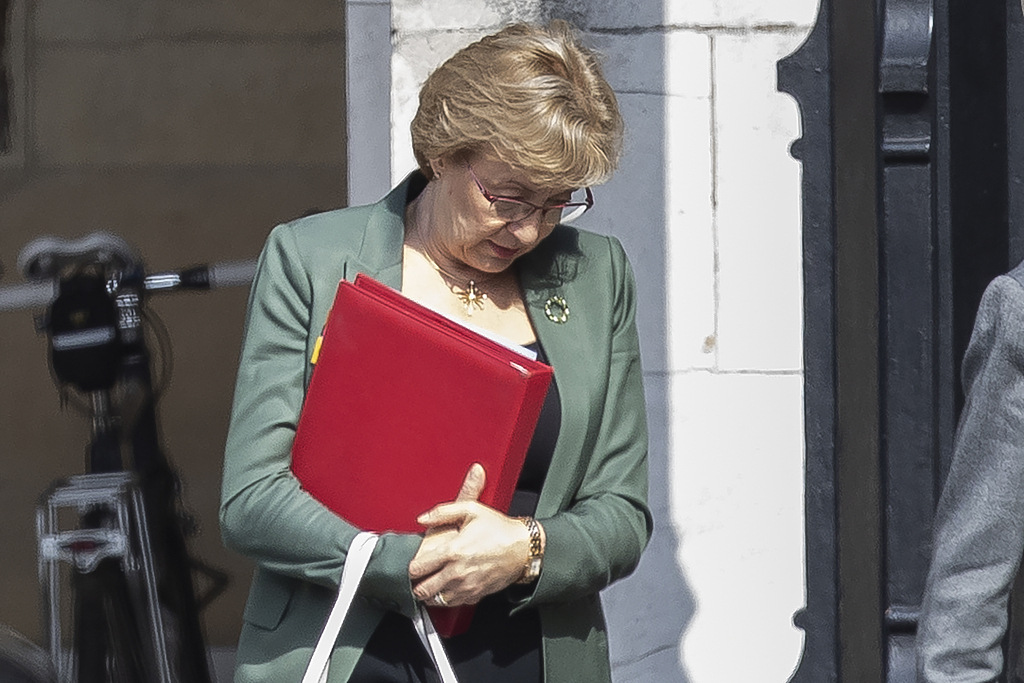
Opinion
08:00, 25-May-2019
May made mistakes, but she had an impossible task
Chris Deacon

Editor's note: Chris Deacon is a postgraduate researcher in politics and international relations at the University of London and previously worked as an international commercial lawyer. The article reflects the author's opinion, and not necessarily the views of CGTN.
British Prime Minister Theresa May publicly confirmed her resignation date on the steps of 10 Downing Street Friday morning. She will step down as leader of the Conservative Party on June 7, but remain prime minister until such time as the party elects a new leader.
Like the three Conservative prime ministers who came before her over the last three decades, May has been brought down by the issue of Europe – an issue which has generated constant tensions and disagreements within her party.
May has received incessant criticism from all sides – both from outside of her party and within – regarding her handling of the Brexit process. Her inability to make progress in a way which satisfied her own MPs made her premiership untenable some time ago, and she has now finally been forced to put a date on her inevitable departure.

British Prime Minister Theresa May makes a statement outside 10 Downing Street in London, May 24, 2019. /VCG Photo
British Prime Minister Theresa May makes a statement outside 10 Downing Street in London, May 24, 2019. /VCG Photo
This criticism has not abated in the wake of her announcement. While her MPs – as tends to be a custom – are speaking of her with warm words now that she has done what they want, many others have set about chronicling the many mistakes of May's approach toward Brexit, arguing how much better things might have been.
There is no doubt that May made damaging political mistakes. In 2017, she called a general election which rather than winning her more seats in the House of Commons lost her Conservative Party its majority and made it much harder for her to pass any future deal on Brexit.
May also repeatedly gave soundbites regarding Brexit which ended up working against her. She argued that "Brexit means Brexit" and "no deal is better than a bad deal" – phrases that have come to be a rallying call for those, now in greater numbers than ever, who argue that only leaving the European Union (EU) without a deal would be a "real" Brexit.
The hollowness of these words was shown by the extent to which May eventually came to play down the possibility of a no-deal Brexit, which she avoided twice by seeking extensions of Article 50 with the EU. They were only a fragile negotiating tactic, and May's bluff was called.
These are some of the mistakes May made, and criticisms of her premiership in light of these – not even to mention policy areas other than Brexit – are entirely valid. But at the same time, there can be little doubt that any other prime minister would also have struggled greatly to implement Brexit successfully.

Leader of the House of Commons Andrea Leadsom outside parliament shortly before it was announced that she is resigning from the government in London, May 22, 2019. /VCG Photo
Leader of the House of Commons Andrea Leadsom outside parliament shortly before it was announced that she is resigning from the government in London, May 22, 2019. /VCG Photo
This is because May's ultimate struggle has not been one over which she has – or any other leader would have – control: the composition of the House of Commons and the positions of individual MPs within it.
May pursued what she saw as a compromise on Brexit, while not openly presenting it as such (or, at least, not until it was too late). She negotiated an agreement with the EU which would see the UK formally leaving the bloc and its institutions, but likely being forced to maintain some form of customs agreement (and possibly certain single market rules) in order to avoid a "hard border" on the island of Ireland.
The problem was that she could not acknowledge the likelihood of these continued links with the EU because she knew that her overwhelmingly eurosceptic party would be against it and so she played down the possibility of them being enforced. This, however, made it easier for the opposition Labour Party to oppose the deal and argue for a closer relationship. In fact, May's deal likely achieved much of what Labour was asking for, but neither side was prepared to admit it.
The harder Brexit supporters in her own party were never prepared to back such a deal, as they understood the reality of what it meant for the UK's future relationship with the EU. At the same time, however, opposition MPs largely against Brexit had every excuse to vote against May's deal too. Many of these MPs, in reality, would likely have voted against any deal as they wish to hold a second referendum which will cancel Brexit.

British Prime Minister Theresa May greets people as she arrives to vote in the European parliament elections, taking place despite Brexit uncertainty, in Sonning, Britain, May 23, 2019. /VCG Photo
British Prime Minister Theresa May greets people as she arrives to vote in the European parliament elections, taking place despite Brexit uncertainty, in Sonning, Britain, May 23, 2019. /VCG Photo
As some are now suggesting she should have, May could have pivoted to the "compromise" angle earlier. But even if doing this attracted more opposition MPs to her cause, it would have alienated more from her own party – a much more dangerous prospect in UK's political system, as we now see clearly in May's forced resignation.
In fact, the criticisms of May now are very telling. Brexit supporters claim she could have been a hero to the country if she'd implemented a hard Brexit or left the EU with no deal. At the same time, Remainers argue she should have compromised with a soft Brexit earlier.
The fact that her critics are still divided in completely opposite ways as to what she did wrong shows how impossible May's task was. There was no approach that would satisfy a majority, let alone everyone on both sides.
May made mistakes – many mistakes, in fact. But it is difficult to see how any other prime minister could have done better. Achieving compromise when there is no compromise that will satisfy the majority is simply impossible.
This is the stark reality of Brexit: there is no one position that currently satisfies a majority of MPs, or perhaps even the public. May tried to battle against this reality and lost.
(If you want to contribute and have specific expertise, please contact us at opinions@cgtn.com.)

SITEMAP
Copyright © 2018 CGTN. Beijing ICP prepared NO.16065310-3
Copyright © 2018 CGTN. Beijing ICP prepared NO.16065310-3